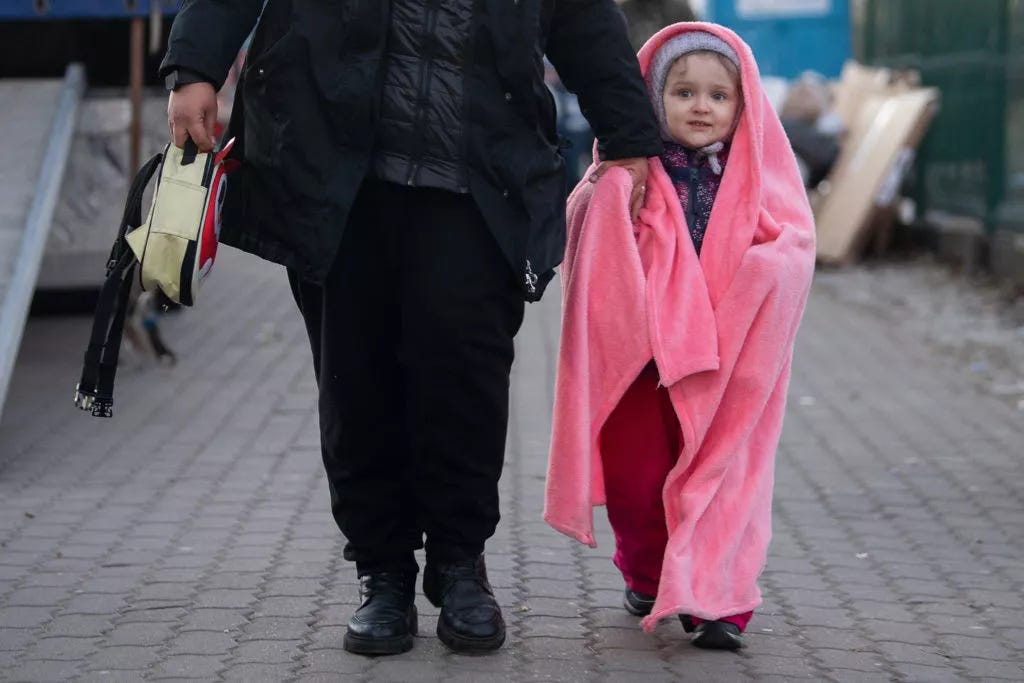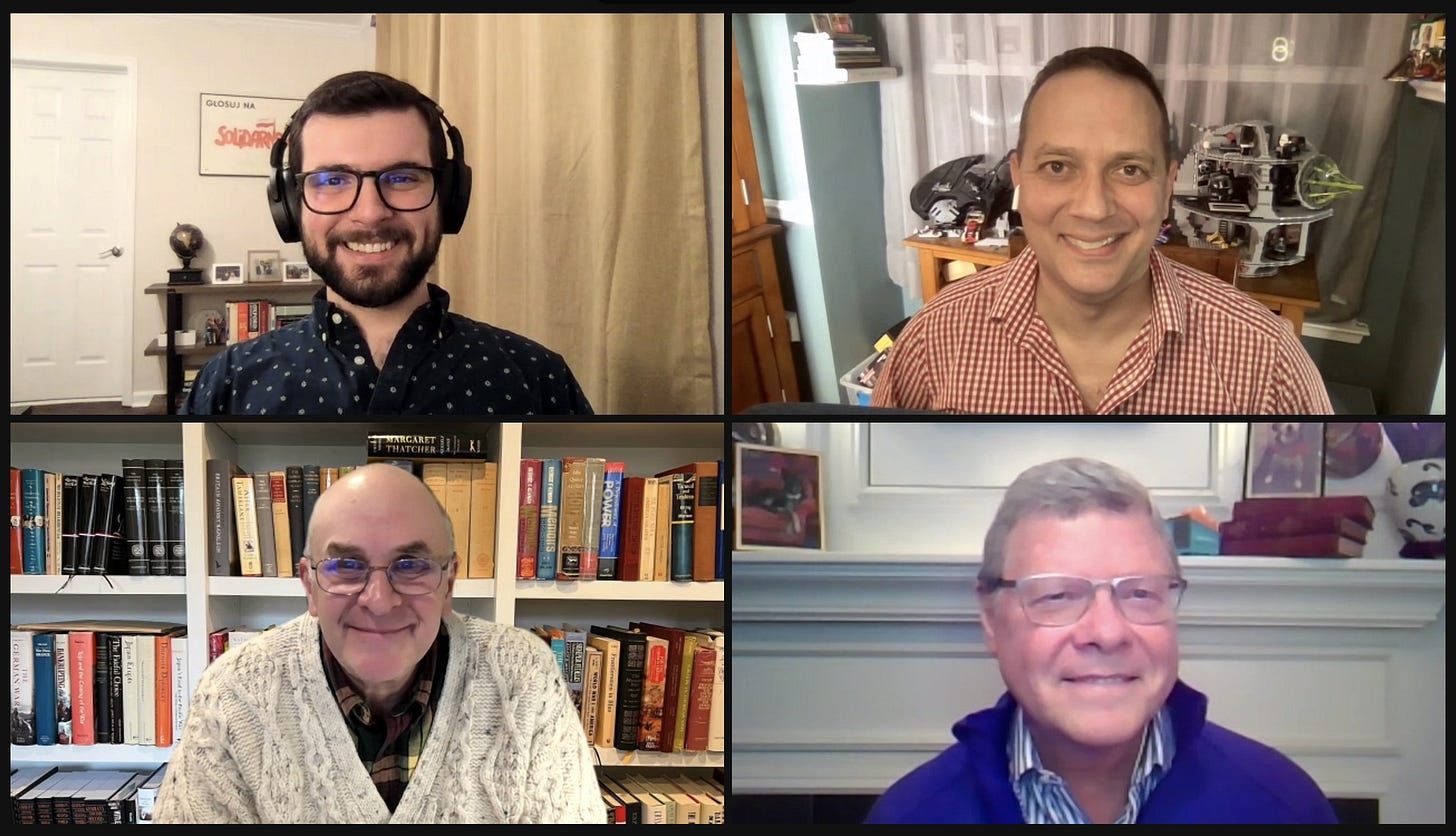Recently at The Bulwark:
CHARLIE SYKES: Madison Cawthorn Is Not An Outlier. 🔐
SONNY BUNCH: ‘Drive My Car,’ ‘After Yang’ Reviews and What Is Good Taste Worth? About $2.5 Billion, Apparently.
THE SECRET POD: The Ukraine FAQ 🔐
You can support The Bulwark by subscribing to Bulwark+ or just by sharing this newsletter with someone you think would value it.
ALI NOORANI: The Moral Clarity of Resettling Refugees.
The United States has a legal process in place for admitting into the country refugees fleeing their homelands. The statutes setting out the refugee-admission process give the president the power to set an upper limit—a “cap” or “ceiling”—on the number of refugees whom the United States will take in. President Trump slashed the number of refugees admitted by more than 85 percent, from a cap of 110,000 that President Obama set for 2017 down to just 15,000 in 2020. Along the way, when the issue of refugee resettlement came up during a fall 2018 cabinet meeting, Stephen Miller infamously said, “What do you guys want? A bunch of Iraqs and ’Stans across the country?”
As a result of the cuts, a third of domestic resettlement offices were forced to close. Within U.S. Citizenship and Immigration Services, 352 refugee corps employees conducting approximately 110,000 refugee interviews a year fell to under 200 officers and barely any interviews.
The consequences for refugees around the world, as well as for American security, have been dire. President Biden set a resettlement cap of 125,000 for fiscal year 2022, but five months in, the administration is on track to resettle just 15,586. If that looks like a Trump-era number, that’s because it takes time and a true commitment to recover from Trump-era cuts.
Attorney George Conway joins to discuss how war has changed America already. Also, the legal and political case for prosecuting Trump.
From Putin-phelia to homophobia to Trump’s Zelensky-envy, Tim Miller’s back with Charlie Sykes on this weekend’s pod.
Bulwark+ members can listen to an ad-free version of these podcasts on their player of choice.
Did you miss TNB? No worries! The free-to-all livestream is right here.
Bulwark+ members get access to every TNB, complete with a podcast version, and archives of all previous shows. Plus, the members-only live chat during the show, and the ability to ask the panelists questions.
SHAY KHATIRI: We Don’t Know Anything About Nuclear War.
Only twice have conflicts erupted between two nuclear-armed states, and both instances (between China and Russia in 1969 and India and Pakistan in 1999) were minor border disputes rather than major wars, in great part because the states involved were wary of escalation to nuclear level. Nobody knows for sure how different actors would react if nuclear-armed states fought in earnest. Known unknowns are scary, and the known unknown of a war between the United States and Russia is frightening enough even before thinking about escalation to the nuclear level. The overuse by the press and Hollywood of such words as “armageddon” and “apocalyptic” has debased the available terminology, leaving the English language without a word sufficiently powerful and grim to convey the prospects of a massive thermonuclear war between the United States and Russia.
It would be wrong to assume that, if the U.S. military enters the conflict in Ukraine in some capacity, nuclear war would inevitably follow. First, it wouldn’t be the first time that Americans and Russians have killed each other. The Soviets reflagged their aircraft during the Korean and the Vietnam Wars and directly engaged with their American enemy. They also launched missiles at American aircraft during the war. The United States, on the other hand, has killed Russian mercenaries as recently as 2018 with no ramifications. In both cases, the Russians benefited from (im)plausible deniability.
🚨OVERTIME 🚨
Let’s Go Billikens! Going into the weekend, my alma mater is still dancing in the A-10 tourney with a last second nail-biter win over St. Bonaventure. (One of their cheerleaders did not take it well.)
What is the Catholic church doing?! The Bishop of Cleveland is going to “bless” a conference headlined by Milo Yiannopoulos.
KONY 2012 at 10… How Joseph Kony, a kidnapper and warlord from Uganda, spurred viral internet activism. And what it’s like, 10 years later.
Where are all the good men dead? Ben Dreyfuss has a question for the screenwriters of Grosse Pointe Blank.
The story of Robin Ficker… A lawyer / heckler who was friends with Muhammad Ali.
How Putin’s Ukraine invasion upended Germany… For the first time since the Cold War, Germany changed its energy and military strategy.
New Matt Labash: Are we cursed, or are we the curse?
Jeff Flake got more than he bargained for… A job trying to broker peace in Ukraine.
Is Ukraine driving a wedge between Trump and the GOP? And will it last?
That’s it for me. Tech support questions? Email members@thebulwark.com. Questions for me? Respond to this message.
—30—
Editorial photos provided by Getty Images. For full credits, please consult the article.







